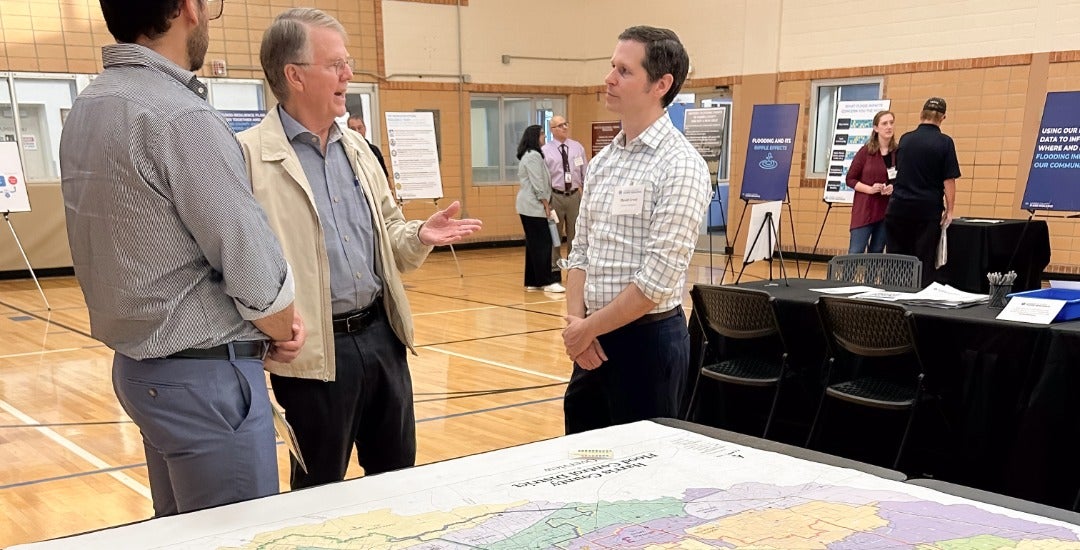After being stranded in his Jacinto City home by Hurricane Harvey floodwaters, Francisco Cedillo considers flooding the most stressful part of living in Harris County.
Cedillo, a 54-year-old administration and finance manager for a nonprofit supporting people with disabilities, brought his personal story last week to an open house for the Harris County Flood Resilience Plan in east Houston. There, he recounted how Hunting Bayou spilled several feet of water into the neighborhood and made Interstate 10 impassable in 2017.
“I get really worried about it, especially being disabled,” Cedillo, who uses a wheelchair, said through an interpreter. “If it gets flooded, I can’t do anything about it. I don’t know what options we have right now, but it’s valuable for me to know all the information I can.”
In a region repeatedly ravaged by floods, Harris County leaders are in the early stages of shaping a wide-ranging plan designed to strengthen readiness for and reaction to major storms. The plan, set for completion in early 2027, aims to build on more than $5 billion in flood-mitigation construction projects by addressing “the well-being of communities facing the physical, social and economic hardships of flooding.”
So far, details of the plan remain sparse. But county leaders say it will contain actionable recommendations on topics ranging from evacuation planning to food access after floods to future infrastructure projects.
“The plan is really for everybody,” said Emily Woodell, chief external affairs officer for the Harris County Flood Control District. “The strategies are going to be everything from what residents can do in their backyard all the way up to what needs to be looked at for the next 30 years for the county.”
Looking beyond the bond
In the years since Hurricane Harvey caused billions of dollars in water damage, Harris County has taken major steps to prevent and lessen the impact of flooding.
Voters in 2018 passed a $2.5 billion bond for flood-related projects, while multiple government agencies and private partners delivered another $2.7 billion for related construction. The county also created a Community Flood Resilience Task Force, made up of 17 local residents, to advise it on planning for the future.
Still, flooding remains a long-term concern for many Houstonians. When asked to forecast the region’s biggest issue 20 years from now, about 15% of respondents to the 2024 Kinder Houston Area Survey picked “pollution, environment and flooding,” the third-most common answer. (Cost of housing and homelessness ranked first, followed by crime and safety.)
County leaders envision the resilience plan as a complementary piece to the flood control bond and community task force.
The resilience plan will feature recommendations for helping residents, businesses, local organizations and government agencies improve their readiness for floods. It will also propose new programs, policies and nature-based solutions for fortifying the region.
“The mitigation work that's happening is really important to make an impact now,” Woodell said. “This plan is helping us inform where we go next after we get that $5.2 billion on the ground.”
The plan will be drafted and implemented by the Harris County Infrastructure Resilience Team, composed of staffers from multiple county government agencies. The Harris County Flood Control District is the lead agency for the initiative, but numerous county departments, community leaders, technical experts and neighborhood groups will also contribute. County commissioners are not expected to make any policy recommendations for the plan.
The city of Houston is not participating in the planning process.
Seeking residents’ help
Feedback from the public is key for the plan’s development, county officials said.
Harris County recently completed its opening round of two public meetings, and will have a second round in March 2026. However, residents can share their comments any time through an online survey.
So far, residents have expressed a need for large-scale upgrades to local infrastructure and better communication to the public during floods, among other priorities, Woodell said.
“This is one of the most impactful ways that people can change the trajectory of our region,” Woodell said.
Esmeralda Valague, an emergency management professional for the Metropolitan Transit Authority of Harris County, said she’s most worried about being flooded in or out of her Kingwood neighborhood. Enabling emergency notifications and preparedness are important, but just a small part of countywide flood resilience, she said.
“Infrastructure is the big elephant in the room,” Valague said. “We can't have enough ways to get water away from risk areas."



